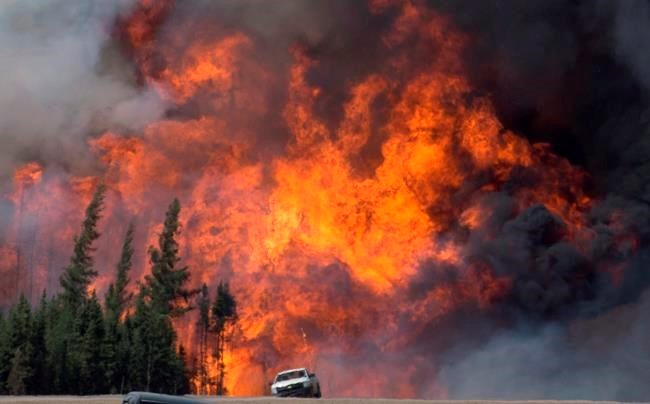Here is a roundup of stories from The Canadian Press designed
to bring you up to speed on what you need to know today...
Fire officials learn from past in Fort McMurray
Bright red hoses thicker than a thigh snake along the highways near Fort McMurray, studded with cannons that can blast enough water into fire-threatened ditches to fill an Olympic-sized swimming pool every 90 minutes.
The soakers help protect buildings, homes and vital routes into and out of the Alberta city against wildfire flames that have forced the evacuation of four neighbourhoods. They're just one of the lessons learned after the catastrophic wildfire that scorched the oilsands hub in 2016.
"The system was designed after 2016," said Derek Sommerville, a wildfire specialist with the Alberta company Fire and Flood Emergency Services.
"We can cover large distances. That frees up traditional mobile resources like fire trucks and helicopters to deal with higher priority areas."
Former wife of admitted serial killer to testify
The ex-wife of an admitted serial killer is expected to testify today in a Winnipeg courtroom.
The woman obtained a protection order against Jeremy Skibicki in 2019, after he allegedly stalked and sexually assaulted her.
Skibicki is on trial facing four counts of first-degree murder for the slayings of four Indigenous women.
His lawyers have said he carried out the killings in 2022 but is not criminally responsible due to mental illness.
Crown prosecutors say the killings were racially motivated and Skibicki preyed on the women at homeless shelters.
A shelter worker has testified Skibicki once said he went there to find a victim.
New Ontario child-care funding model set for 2025
Ontario has told child-care centres that it will implement a new way of funding the national $10-a-day program — something operators have urgently called for — starting in 2025.
Child-care centres, including the YMCA, the largest operator in the province, have been warning about the risk of closures if the funding formula isn't soon updated to cover the actual cost of providing care, rather than just replacing the revenue they've lost from the now-discounted fees.
After several delays, the province told them in a memo last week that the new structure will be in place for next year.
"The priority for us is to provide certainty to the operators," Education Minister Stephen Lecce said in a recent interview.
Traditionally, child-care centres have raised parent fees when they faced rising expenses such as staffing costs, catering, rent, heating and supplies. However, any operator that wanted to sign on to the national plan had to freeze their fees in March 2022, and many had voluntarily frozen them since 2020, not wanting to raise rates during the COVID-19 pandemic.
Fourth accused in Nijjar murder appears in court
A fourth man accused in the murder of British Columbia Sikh activist Hardeep Singh Nijjar will next appear at provincial court on May 21, the same day the other three accused are scheduled for a hearing.
The BC Prosecution Service says 22-year-old Amandeep Singh appeared via video link for his first appearance in a Surrey, B.C., court on Wednesday, and the matter has been put forward to next week.
The three other men accused in Nijjar's murder — Karan Brar, Kamalpreet Singh and Karanpreet Singh — will all appear in Surrey court on the same date.
Singh, like the others, was charged with first-degree murder and conspiracy to commit murder, although he was already in the custody of Peel Regional Police in Ontario for unrelated firearms charges.
The case has frayed Canada-India relations after Prime Minister Justin Trudeau said credible intelligence linked Nijjar's death to Indian government involvement.
India has denied being involved.
Co-opting Indigenous identities main topic at summit
A two-day summit on Indigenous identity fraud wrapped up Wednesday with a message to Canada: we're joining forces, and we want action to curb the epidemic.
The summit, hosted by the Manitoba Métis Federation and the Chiefs of Ontario, was lauded by First Nations, Inuit and Red River Métis leaders as a historic occasion.
The leaders passed two resolutions that specifically target the Métis Nation of Ontario and the NunatuKavut Community Council — organizations they collectively say are co-opting Indigenous identities for personal gain.
"The intent of this summit is not to pick a fight," said Manitoba Métis Federation president David Chartrand.
"We have every right and all responsibility to stand up for ourselves and protect our identity. The time to bring this to a head is now."
The NunatuKavut Community Council did not immediately respond to a request for comment.
Métis Nation of Ontario president Margaret Froh has consistently stepped out to defend her organization and its membership.
"It is deeply disappointing that we have reached a point where once firm allies cannot sit down and discuss the issues currently affecting our peoples," Froh, who was denied a speaking role at the summit, said in a statement Wednesday.
---
This report by The Canadian Press was first published Thursday, May 16, 2024
The Canadian Press



